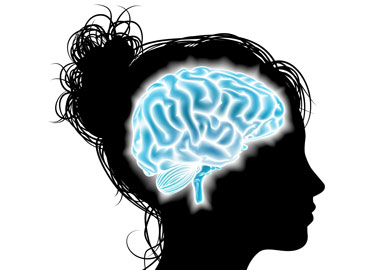
November 4, 2016
Brain differences reminiscent of changes observed in Alzheimer’s disease may be visible as early as childhood, a new report found, suggesting that the illness may be a disorder that unfolds over many decades.
The brain changes were detected in people with a gene called APOE-E4 that is tied to an increased risk for Alzheimer’s in old age. About one in six people carry at least one copy of the gene. But many people with the gene never get Alzheimer’s, and many with the disease do not carry the gene.
The study, which appeared in the journal Neurology, looked at 1,187 healthy children and young adults. They ranged in age from 3 to 20. All had brain scans and tests of memory and thinking skills. They were also tested to see whether they carried the APOE-E4 gene.
The researchers found that those who carried the Alzheimer’s gene tended to have a smaller hippocampus, a seahorse-shaped area of the brain critical for memory. The hippocampus is among the first areas of the brain to be damaged by Alzheimer’s disease.
Children who carried the APOE-E4 gene also had other brain changes typical of Alzheimer’s disease, said Dr. Linda Chang, the study’s lead author and the director of neuroscience at the University of Hawaii in Honolulu. “Studying these genes in young children may ultimately give us early indications of who may be at risk for dementia in the future, and possibly even help us develop ways to prevent the disease from occurring or to delay the start of the disease,” she said.
The study also found that very young children who had changes in the hippocampus and other areas affected by Alzheimer’s tended to perform worse on various tests of thinking, memory and attention, though the deficits tended to disappear by age 8 to 10. The changes were very subtle and did not affect overall intelligence or performance in school.
In an editorial that accompanied the study, Dr. Rebecca Knickmeyer, an assistant professor of psychiatry at the University of North Carolina at Chapel Hill, said that the findings raise the “intriguing” possibility that Alzheimer’s might be viewed in part as a developmental disorder that begins in the earliest years. The findings also raise the possibility that doctors could “intervene early through some noninvasive approach, like diet or cognitive training,” she said. Indeed, even if it could be categorized as a developmental disorder, it does not mean that there is nothing to do to improve the condition.
The findings underscore the need for more research to understand the underlying causes of Alzheimer’s, and for effective treatments to stop the progression of disease. Experts believe that treatments may be most effective when given at an early point in the disease, before damage to the brain becomes extensive. What those treatments might be, and when they should begin, is the subject of ongoing research.
By ALZinfo.org, The Alzheimer’s Information Site. Reviewed by Marc Flajolet, Ph.D., Fisher Center for Alzheimer’s Research Foundation at The Rockefeller University.
Sources:
Linda Chang, Vanessa Douet, Cinnamon Bloss, et al: “Gray matter maturation and cognition in children with different APOE E genotypes.” Neurology, July 13, 2016
Rebecca Christine Knickmeyer, M. Elizabeth Ross: “Imaging and Rare APOE Alleles: Alzheimer Disease as a Developmental Disorder.” Neurology, July 13, 2016











